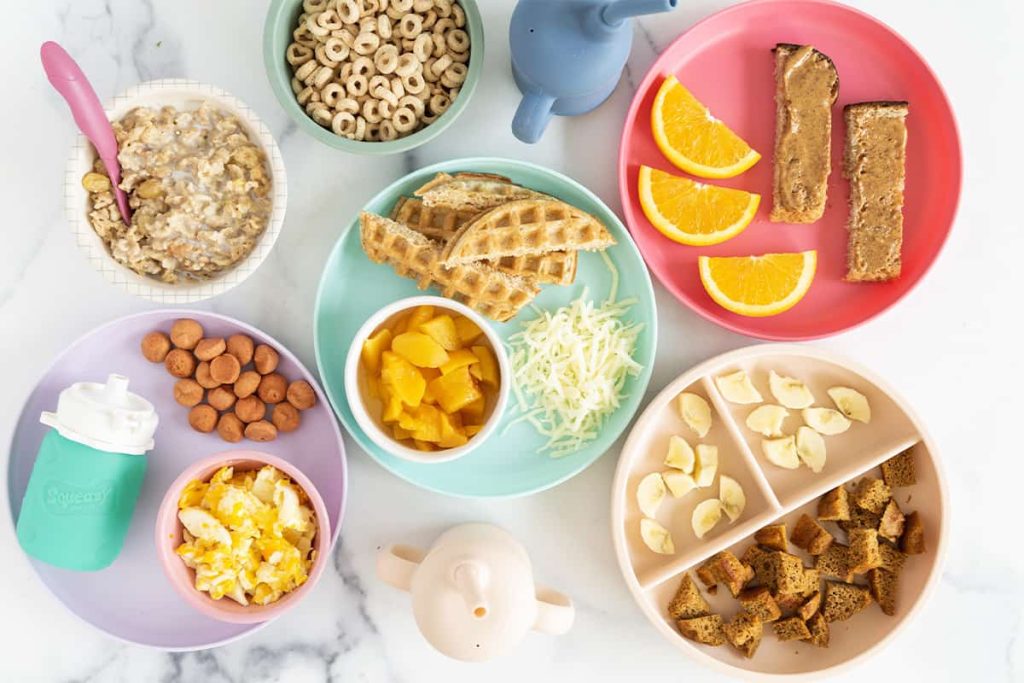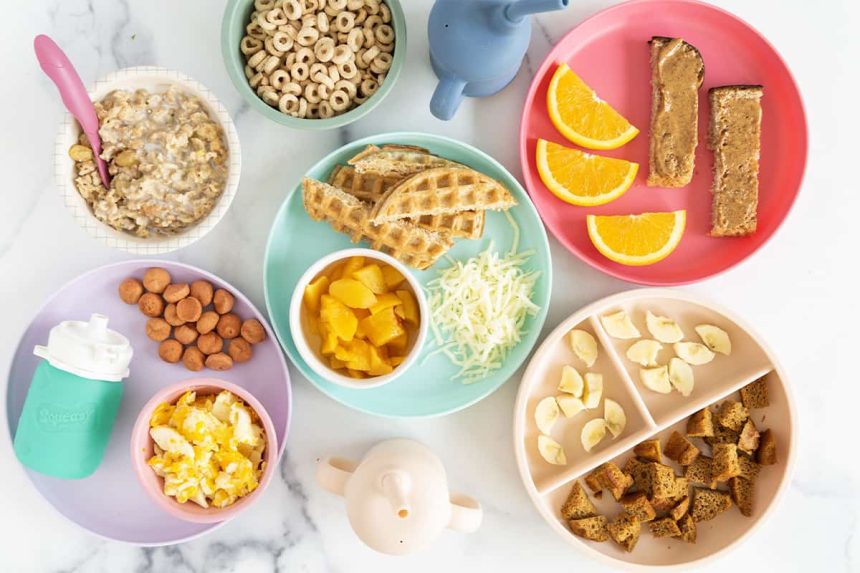In the formative months of early childhood, nutrition plays a pivotal role in fostering growth and development. By the time infants reach nine months of age, their dietary needs evolve significantly as they transition from exclusive breastfeeding or formula feeding to a more diverse array of solid foods. This critical phase not only marks a new chapter in their nutritional journey but also presents an opportunity for caregivers to instill healthy eating habits that can influence lifelong dietary preferences. The morning meal, often considered the most important of the day, carries particular significance in establishing a balanced intake of essential nutrients.
This article explores a variety of nutritious breakfast ideas for nine-month-old infants, emphasizing the importance of incorporating whole foods that promote developmental milestones while catering to their emerging tastes and textures. By offering practical and health-conscious options, we aim to empower parents and caregivers to provide a robust start to their child’s day, ultimately nurturing their physical and cognitive growth during this crucial period.
Exploring Nutritional Needs for Nine-Month-Old Infants

At nine months, infants undergo rapid growth and developmental changes, necessitating a well-rounded diet that caters to their evolving nutritional needs. This age marks a significant transition where breast milk or formula remains vital, but solid foods increasingly become a critical source of nutrients. Key components of a balanced breakfast for infants include **iron**, **calcium**, **healthy fats**, and **vitamins**, which collectively support cognitive development, bone health, and overall growth. Foods like iron-fortified cereals, pureed fruits, and yogurt are excellent choices that can introduce diverse flavors and textures while ensuring essential nutrients are met.
When planning breakfast options for your nine-month-old, consider incorporating a variety of ingredients that stimulate both taste and nutrition. Here are some suggestions:
-
- Oatmeal - Cooked and blended with mashed bananas or applesauce for natural sweetness.
-
- Scrambled Eggs – Soft and fluffy, these provide protein and healthy fats.
-
- Avocado Toast - Whole grain toast topped with mashed avocado offers healthy fats and fiber.
-
- Fruit Smoothies – Blend yogurt with pureed fruits for a creamy and nutritious beverage.
-
- Pancakes – Whole grain pancakes made with minimal sugar, served with a side of fruit puree.
In addition to diversifying flavors, it’s essential to ensure the safe preparation of food to prevent choking hazards. Soft foods that are easy to mash are ideal, and introducing new ingredients one at a time can help monitor for allergies. Below is a simple table outlining suitable breakfast foods and their nutritional benefits:
| Food | Nutritional Benefits |
|---|---|
| Iron-Fortified Cereal | High in iron; supports cognitive development |
| Yogurt | Calcium and probiotics; aids digestion |
| Mashed fruits (e.g., banana, apple) | Rich in vitamins; promote overall health |
| Cooked Eggs | Protein-rich; essential for growth |
| Whole grain bread | Fiber; supports digestive health |
Incorporating Fresh Ingredients into Breakfast Choices
To enhance the nutritional value of your little one’s breakfast, consider integrating **fresh ingredients** that provide essential vitamins and minerals. Fresh fruits, for example, not only add vibrant colors but also boost the flavor profile of any meal. Soft fruits like **banana**, **pear**, and **avocado** can be mashed or blended into smoothies, making them easy for babies to digest. Vegetables such as **spinach** and **sweet potato** can be finely puréed and mixed into oatmeal or yogurt for a nutrient-dense start to the day. You can also introduce **whole grains**, which are rich in fiber and essential nutrients, making dishes more filling and satisfying for your baby.
Moreover, incorporating fresh herbs and seeds can elevate simple dishes while introducing diverse flavors. For instance, a sprinkle of **cinnamon** on a bowl of oatmeal or mixing in some **chia seeds** can enhance both the taste and the nutritional benefits. A creative breakfast option could be a **mini breakfast bowl**, combining soft-boiled eggs, diced vegetables, and a sprinkle of fresh herbs. Below is a simple table showcasing some nutritious and easy-to-prepare breakfast ideas that utilize fresh ingredients:
| Breakfast Idea | Main Ingredients |
|---|---|
| Mashed Banana & Oatmeal | Mashed banana, rolled oats, water/milk |
| Avocado Toast | Whole grain bread, ripe avocado, a pinch of salt |
| Vegetable Omelette | Eggs, spinach, diced bell pepper, cheese |
| Fruit Smoothie | Banana, berries, yogurt, spinach |
Balancing Texture and Taste for Developing Palates
As infants transition into solid foods, it becomes essential to explore a variety of flavors and textures. This early stage of feeding not only influences their immediate preferences but also sets the groundwork for future eating habits. Introducing a mix of **creamy**, **chunky**, and **smooth** textures can help babies develop their oral skills while simultaneously engaging their taste buds. For instance, combining **mashed bananas** with **oatmeal** creates a rich, velvety base that is both nutritious and appealing. Additionally, incorporating finely chopped fruits or vegetables can introduce subtle crunchiness, making breakfast more exciting.
Moreover, the presentation of food plays a crucial role in enticing babies to enjoy their meals. Creating a colorful plate can stimulate visual interest, encouraging them to explore new tastes. Consider serving **scrambled eggs** alongside **avocado slices** and **diced tomatoes** to provide a delightful contrast of colors and textures. As babies learn to self-feed, offering options like **toasted whole-grain fingers** or **soft fruit chunks** can enhance their tactile experience. Here is a simple table showcasing various breakfast combinations that strike a balance between texture and taste.
| Breakfast Option | Texture | Main Ingredients |
|---|---|---|
| Banana Oatmeal Mash | Smooth | Banana, Oats, Milk |
| Avocado Toast | Chunky | Whole-grain Bread, Avocado |
| Scrambled Eggs with Spinach | Creamy | Eggs, Spinach, Cheese |
| Fruit & Yogurt Parfait | Layered | Yogurt, Berries, Granola |
Quick and Convenient Breakfast Recipes for Busy Parents
When it comes to breakfast for babies around nine months old, the key is to ensure that meals are both nutritious and easy to prepare. A variety of soft textures and flavors can help engage your little one’s taste buds while meeting their dietary needs. Consider offering combinations such as:
-
- Mashed avocados spread on whole grain toast for healthy fats.
-
- Oatmeal mixed with pureed fruits like banana or apple for added sweetness and fiber.
-
- Scrambled eggs with finely chopped spinach to boost protein and iron.
-
- Yogurt blended with soft berries for a calcium-rich treat.
To further simplify mealtime, batch-cooking and freezing can be your best friends. Preparing small portions of nutritious purees or finger foods in advance can save time during busy mornings. Here’s a quick table of ideas for make-ahead breakfast options:
| Food | Preparation Method | Freezing Instructions |
|---|---|---|
| Fruit Puree | Blend and strain soft fruits | Pour into ice cube trays and freeze |
| Mini Pancakes | Cook and cool | Layer with parchment paper in a freezer bag |
| Vegetable Muffins | Bake and cool | Store in airtight container or freezer bag |
These strategies not only streamline your breakfast routine, but they also provide a diverse array of flavors and nutrients critical to your baby’s growth and development. Ensuring a well-rounded breakfast for your little one can set a positive tone for the rest of the day, even amidst the chaos of parenting.
Q&A
Q&A: Baby Breakfast Ideas for 9 Months – A Nutritious Start to the Day
Q1: Why is breakfast important for a 9-month-old baby?
A1: Breakfast serves as a critical meal for infants, particularly at 9 months when they begin to explore a broader range of flavors and textures. This stage marks a significant period of growth and development, necessitating an adequate intake of essential nutrients. A nutritious breakfast lays the foundation for sustained energy levels, cognitive function, and overall health throughout the day, contributing to optimal physical development and dietary habits.
Q2: What should be the main nutritional focus for a breakfast designed for a 9-month-old?
A2: The nutritional focus for a breakfast suitable for a 9-month-old should encompass a balance of macronutrients—carbohydrates, proteins, and fats—alongside essential vitamins and minerals. Key nutrients to include are iron, calcium, vitamin D, and healthy fats. Incorporating a variety of food groups such as fruits, vegetables, grains, and proteins will ensure that the breakfast meets the baby’s growing nutritional needs while also promoting diverse palate development.
Q3: Can you provide examples of nutritious breakfast ideas for babies at this age?
A3: Certainly. Some wholesome breakfast ideas for a 9-month-old include:
-
- Oatmeal with Fruit: Rolled oats cooked with water or breast milk, topped with mashed bananas or pureed apples, provides fiber and essential vitamins.
-
- Avocado Toast: Whole grain toast with mashed avocado offers healthy fats and vital nutrients; small pieces of soft toast can enhance self-feeding skills.
-
- Yogurt Parfait: Full-fat plain yogurt layered with pureed fruits and a sprinkle of ground flaxseed provides protein and probiotics that aid digestion.
-
- Scrambled Eggs: Softly scrambled eggs are an excellent source of protein and healthy fat; they can be mixed with pureed vegetables for added nutrition.
-
- Smoothie Bowl: A blend of breast milk or formula with fruits and spinach, served in a bowl, allows for exploration of textures and flavors.
Q4: How can caregivers ensure that breakfast is safe for a 9-month-old baby?
A4: Safety in food preparation and serving is paramount for infants. Caregivers should ensure that all foods are appropriately cooked and mashed or cut into small, manageable pieces to prevent choking. It is advisable to avoid foods that are hard, round, or sticky until the child has developed the necessary chewing skills. Monitoring for allergies, introducing new foods one at a time, and consulting pediatric dietary guidelines can further enhance safety.
Q5: What role does self-feeding play in breakfast for a 9-month-old, and how can it be encouraged?
A5: Self-feeding promotes fine motor skills and encourages autonomy in infants, fostering a positive relationship with food. Caregivers can encourage self-feeding by offering finger foods and allowing the baby to explore various textures. Providing small amounts of a variety of foods on a tray enables the baby to choose and experiment with different flavors. Supervision during meals is crucial to ensure safety while the baby engages in this developmental milestone.
Q6: Are there any foods that should be avoided in a baby’s breakfast at this age?
A6: Yes, certain foods should be avoided for 9-month-old babies. These include honey (due to the risk of botulism), whole nuts, popcorn, and foods with added sugars or excessive salt. Additionally, it is prudent to avoid cow’s milk as a drink until after the age of one; however, small amounts of dairy products like yogurt and cheese, which are lower in protein and high in calcium, can be introduced.
Q7: How can caregivers maintain variety in a baby’s breakfast options over time?
A7: Maintaining variety in a baby’s breakfast can be achieved by rotating different food groups and introducing seasonal fruits and vegetables. Caregivers can experiment with new textures and flavors by mixing purees or creating new combinations of familiar foods. Involving the baby in the food selection process, such as allowing them to reach for different items during meal times, can also foster interest and enjoyment in breakfast.
This Q&A provides a comprehensive overview of essential considerations for developing nutritious breakfast ideas for 9-month-old babies, emphasizing the importance of balanced nutrition, safety, self-feeding practices, and variety in meal options.
Final Thoughts
providing a nutritious breakfast for infants at the 9-month mark is crucial for their growth, cognitive development, and overall well-being. As this article has explored, a diverse array of options—ranging from iron-fortified cereals to a variety of fruits and whole grains—can cater to the evolving tastes and dietary requirements of babies. It is essential for caregivers to remain attentive to the nutritional needs and preferences of their children while introducing a variety of flavors and textures. The breakfast choices outlined herein not only support the foundational health of infants but also encourage healthy eating habits that can last a lifetime. As we continue to prioritize childhood nutrition, these simple yet effective meal ideas serve to empower parents in their pursuit of fostering a healthy start for their children’s day.


